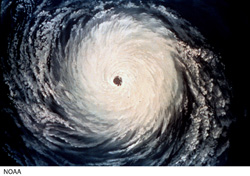Severe Storm Safety
Electrical Safety During Severe Storms
Beware of the dangers hurricanes and other severe weather can cause when water comes in contact with electricity.
To protect against the hazards of the aftermath of severe storms:
- Take care when stepping into a flooded area. Submerged outlets or electrical cords may energize the water, posing a potential lethal trap.
- Do not use electrical appliances that have been wet. Water can damage the motors in electrical appliances, such as furnaces, freezers, refrigerators, washing machines and dryers. For those that have been under water, have them reconditioned by a qualified service repairman, or purchase new ones.
- Take special care with portable electric generators, which can become deadly if improperly installed or operated.
- Do not connect generators directly to household wiring. Power from generators can backfeed along power lines and electrocute anyone coming in contact with them, including lineworkers making repairs. A qualified, licensed electrician should install your generator to ensure that it meets local electrical codes.
- Make sure your generator is properly grounded.
- Keep the generator dry.
- Always follow the generator manufacturer's guidelines regarding appliances and extension cords.
- Make sure extension cords used with generators are rated for the load, have three-pronged plugs and are not damaged.
- Do not overload the generator.
- Do not operate the generator in enclosed or partially enclosed spaces. Generators can produce high levels of deadly carbon monoxide very quickly.
- Use a ground fault circuit interrupter to help prevent electrocutions and electrical shock injuries.


